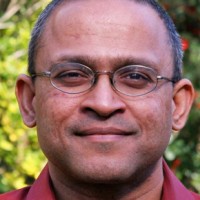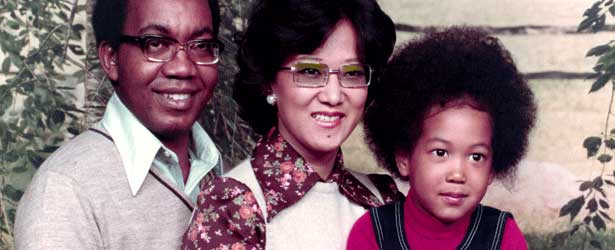by Ravi Chandra, M.D.
March 12, 2012
I had the great pleasure of viewing Eliaichi Kimaro’s wonderful documentary A LOT LIKE YOU. The film will screen again on Tuesday, March 13th at 9:20 pm, and I highly recommend it. As I wrote about it last week,
“Her documentary is powerful and heart-warming, telling several stories at once, and all of them well: the story of her Tanzanian father’s leaving his Chagga tribal roots, coming to America and marrying her Korean mother; a story from Tanzanian Independence; the story of her parents’ amazing lives together; the story of her father’s family, particularly his sisters, and the difficulties they endured; and her own long-secret story of abuse which led her to become a trauma counselor.
All these stories are finally woven together in a womb-like, circular Chagga hut, a replica of her father’s family home that he has rebuilt in honor of family and memory. There is only one way in and out of this womb – one feels it is the path of relating, remembering and holding memory across the generations, a thread and tie made secure by the active work of the director, and now passed to us, the audience, in the womb of a darkened theater.”
From her press kit: Independent Director and Producer Eliaichi Kimaro is a mixed race, first- generation American who worked for 15 years as a professional crisis counselor for survivors of rape and domestic violence before becoming a filmmaker. Her company, 9elephants productions (http://www.9elephants.org), uses video as a means to address social justice issues, bringing stories of struggle, resistance and survival to a broader audience. Eliaichi produces videos for non-profits working within underserved communities to address social and economic justice issues. Eliaichi brings a lifetime of personal and professional experience dealing with race, gender, domestic and sexual violence to her directorial debut, the autobiographical film, A Lot Like You, which won Best Documentary at the 2011 Montreal International Film Festival, and won the Top 10 Audience Choice Award when it premiered at the 2011Seattle International Film Festival.
Eli Kimaro was kind enough to answer a few questions by email.
1. A LOT LIKE YOU reminded me of other documentaries where people look for their roots. Were you inspired by any documentaries in particular?
Before leaving for Tanzania, my partner Tom and I immersed ourselves in personal documentaries. This was my schooling–learning from what others have done, what worked, what rubbed me the wrong way. Some docs that stood out for me during this period were First Person Plural, My Architect, Tell Them Who You Are, Tongues Untied.
But the film that stuck with me the most while filming in our village on Mt Kilimanjaro was Daughter from Danang. Heidi’s struggle with her racial identity and issues of belonging, the challenging dynamics of both her American and her Vietnamese families — it was so familiar, the discomfort so visceral, it was hard for me to watch. And I was really struck by the power of the camera to command your attention, almost forcing you to attend to a situation when you would rather look away.
2. Whom do you think you’re “a lot like”?
Our title definitely leaves a lot to interpretation…
For me personally, over the course of making this film, I’ve come to understand that I am like my Chagga aunts in ways I never could have imagined. And that I’m a lot more like my father than I realized.
And then, there’s this way that people, after seeing our film, often make the mistake of calling it “A Lot Like Me.” That slip up makes me smile, and I never correct it. Because it speaks to how strongly this story resonates with anyone—regardless of race, culture, age, gender, class—who’s curious about exploring their family or their culture to better understand who they are and where they come from. So then our title also refers to the surprising connection that viewers sometimes feel to my family and this journey that unfolds on the screen.
3. Indeed, you found resonances with your father’s sisters, and even your father. It was very touching to see your daughter watching your aunties sing on the television, a thread of history that she carries with her as well, through your work. That seemed to be the most unexpected resonance.
Maybe you can talk a little bit about what you were expecting or hoping to find when you started this project.
This project was born out of that slightly panicked realization that, if my partner and I were to have kids, their understanding about what it means for them to be Korean or Chagga would have to come from me. The mere thought of that responsibility was terrifying. Because what the hell did I know?!
So when we came up with the idea to make this film, I felt a huge sense of relief. Never mind that we had zero skills or equipment or know-how…I felt like I had finally figured out a way to preserve our cultural heritage and family stories–not only for our (future) kids, but also for me.
But I was surprised to discover that this film project was of benefit to my Dad as well. My cultural exploration was helping him reconnect with his Chagga roots. Because despite having been born and raised in Tanzania, after living in the US for 40 years, my Dad had become a cultural insider/outsider like me–just to a different degree.
When we landed in Tanzania, my original intent was to make a film about the challenges my Dad was facing as he tried to fit back in with the family and culture that he’d left behind 40 years earlier (our working title then, “Worlds Apart”). We showed up with all the hubris of novice American filmmakers raised on a healthy diet of National Geographic specials. And the “brand” of Chagga culture I was hoping to capture was robust and colorful, complete with songs, dance, folklore, spirituality, traditional healing practices, systems of governance and discipline and justice…
So for months, we went on this wild goose chase as we tried to capture what we thought of as Chagga culture. It wasn’t until we stopped chasing down some non-existent ideal, and just opened ourselves up to what was right in front of us–my family’s stories–that we came to a deeper understanding of what culture is really about.
4. Did the making of the film change your relationship with your parents? I think all the audience will wonder what happened when your parents saw the film, and found out what had happened to you – do you want to reveal any of that?
I appreciate that it can be hard to sit with ambiguity. Our film definitely captures that moment when you know exactly what you need to do to make something right…but the thought of doing it fills you with dread. That tension is perfectly preserved in this film, because on the day we locked picture and I recorded those final lines of narration, that is precisely where I was in my process –sitting with the uncertainty of not knowing how the story was going to unfold from here.
And you’re right. After every screening, when the lights come up, people are curious about what happened next. I’m amazed at how invested they are in the story, wanting to know how my parents responded when they saw the film. And I’m always happy to reflect on this question in person after a screening, when the entirety of our story is still fresh in people’s minds.
But answering this question, in writing, in advance of people seeing the film, is a tricky balance. So I will keep this answer brief:
My parents saw the film on their own, in their home in Tanzania. And it wasn’t until 2 years later that I saw my Dad in person. When asked how he felt about what was shared in the film, his response was “the conversations this film is opening up for all of us has been nothing short of liberating, and can only make us stronger as a family.”
5. How did your exploration bring up issues that perhaps were never discussed openly between your parents? I am thinking of their disagreement/different points of view about your aunties.
While I can’t speak specifically to the impact of my journey on my parents, what I have come to realize is that, at its core, this film explores how our own hidden truths filter the stories that get passed down. In three separate instances– first with my Aunts, then my Dad, then me–we each arrive at that moment where we must choose whether to be complicit in the shaming silence or to finally break through it…
We witness the transformation that takes place in my Aunts as they find the words to finally speak their truth. It’s the Power of their story that compels us to deeply consider the hidden truths in our own lives. And it invites us to reach out and connect with each other from this vulnerable, humble place.
At the end of our interview, my Aunts asked me, “Now that we’ve shared our stories with you…what are you going to do about it?” It really was more of a commandment, a call to action, than a question. But their courage in speaking up inspired me (albeit years later) to do the same in my storytelling. And now, it’s amazing to see how many lives are being transformed by this small ripple that was set in motion 9 years ago when my Aunts opened up and shared their truth with me in a hut on a mountain halfway around the world.
6. How did the doc fit into and change your life?
I am still involved in sexual and domestic violence work, just not in the crisis counseling and support capacity of my earlier years. In 2003, when we returned from our 9 month shoot on Mt Kilimanjaro, I realized that I now had a skill set that is relevant and greatly needed in our activist communities. So I founded my own video production company, 9elephants productions. And for the past eight years, I have been producing videos for local and national non-profits working within traditionally marginalized and underserved communities to address social/ economic justice issues. I love helping people, who are passionate and relentless in their commitment to justice, find creative ways to bring their stories, their mission, their vision, to the screen.
A Lot Like You will screen again on Tuesday, March 13th at 9:20 pm
Watch the trailer:
 Ravi Chandra, M.D. is a psychiatrist and writer in San Francisco. You can find more of his writing and spoken word performances at www.RaviChandraMD.com. His blog for Psychology Today, The Pacific Heart, is here http://www.psychologytoday.
Ravi Chandra, M.D. is a psychiatrist and writer in San Francisco. You can find more of his writing and spoken word performances at www.RaviChandraMD.com. His blog for Psychology Today, The Pacific Heart, is here http://www.psychologytoday.
Follow him on Twitter at https://twitter.com/going2peace






1 Comment